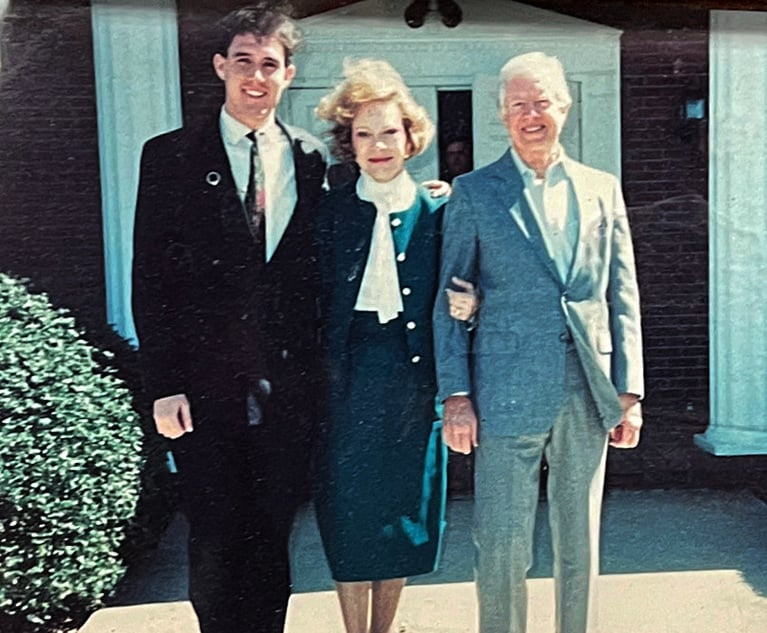Private Judges: How New York Can Unclog the Backlog
Change may not be easy at first, but progress often does not happen without some form of change.
December 09, 2022 at 02:30 PM
10 minute read
 The backlog in the New York judicial system following the COVID-19 pandemic that began in 2020 is undeniable. Much has happened since Chief Administrative Judge Lawrence K. Marks issued his Sept. 29, 2020 Memorandum wherein he noted that then Governor Andrew Cuomo had exercised emergency powers afforded to him by the legislature to cut the judiciary budget by 10%, or approximately $300 million. The operation of the judicial system, how trials are conducted, how court appearances are conducted, etc., have all been impacted by the backlog and the COVOD-19 pandemic.
The backlog in the New York judicial system following the COVID-19 pandemic that began in 2020 is undeniable. Much has happened since Chief Administrative Judge Lawrence K. Marks issued his Sept. 29, 2020 Memorandum wherein he noted that then Governor Andrew Cuomo had exercised emergency powers afforded to him by the legislature to cut the judiciary budget by 10%, or approximately $300 million. The operation of the judicial system, how trials are conducted, how court appearances are conducted, etc., have all been impacted by the backlog and the COVOD-19 pandemic.
And yet, while the New York legislature continues to enact new laws that impact our judicial system, and practitioners continue to be required to adapt to new procedural rules and requirements, private judging akin to the model embraced by the state of California remains seemingly elusive. Specifically, the California Constitution, and California's Code of Civil Procedure, authorize parties to stipulate to the use of a private judge and to define the authority granted to the person selected as private judge. For a description of the particulars of the California model, see Saxe and Catterson, A Proposal for Private Judging in New York, New York Law Journal (March 12, 2021).
On his website, Duncan Wardle—the former Head of Innovation and Creativity for the Walt Disney Company—explains the "power of yes." Wardle explains the pervasiveness in our culture of reacting to new ideas with an almost instinctual "No, because" response. One can read the following on his website:
This content has been archived. It is available through our partners, LexisNexis® and Bloomberg Law.
To view this content, please continue to their sites.
Not a Lexis Subscriber?
Subscribe Now
Not a Bloomberg Law Subscriber?
Subscribe Now
NOT FOR REPRINT
© 2025 ALM Global, LLC, All Rights Reserved. Request academic re-use from www.copyright.com. All other uses, submit a request to [email protected]. For more information visit Asset & Logo Licensing.
You Might Like
View All
‘Issue of First Impression’: New York Judge Clears Coinbase Appeal Amid Crypto Regulatory Clash
4 minute read
Meet the Long Island Judge Tapped to Be US Attorney for Eastern District of New York
3 minute read
Lessons in Mediation & Negotiation: Attorneys' Reflections on Jimmy Carter

Preemptive Litigation: A Potential Approach for a Precise Situation
13 minute readLaw Firms Mentioned
Trending Stories
- 1Reviewing Judge Merchan's Unconditional Discharge
- 2With New Civil Jury Selection Rule, Litigants Should Carefully Weigh Waiver Risks
- 3Young Lawyers Become Old(er) Lawyers
- 4Caught In the In Between: A Legal Roadmap for the Sandwich Generation
- 5Top 10 Developments, Lessons, and Reminders of 2024
Who Got The Work
J. Brugh Lower of Gibbons has entered an appearance for industrial equipment supplier Devco Corporation in a pending trademark infringement lawsuit. The suit, accusing the defendant of selling knock-off Graco products, was filed Dec. 18 in New Jersey District Court by Rivkin Radler on behalf of Graco Inc. and Graco Minnesota. The case, assigned to U.S. District Judge Zahid N. Quraishi, is 3:24-cv-11294, Graco Inc. et al v. Devco Corporation.
Who Got The Work
Rebecca Maller-Stein and Kent A. Yalowitz of Arnold & Porter Kaye Scholer have entered their appearances for Hanaco Venture Capital and its executives, Lior Prosor and David Frankel, in a pending securities lawsuit. The action, filed on Dec. 24 in New York Southern District Court by Zell, Aron & Co. on behalf of Goldeneye Advisors, accuses the defendants of negligently and fraudulently managing the plaintiff's $1 million investment. The case, assigned to U.S. District Judge Vernon S. Broderick, is 1:24-cv-09918, Goldeneye Advisors, LLC v. Hanaco Venture Capital, Ltd. et al.
Who Got The Work
Attorneys from A&O Shearman has stepped in as defense counsel for Toronto-Dominion Bank and other defendants in a pending securities class action. The suit, filed Dec. 11 in New York Southern District Court by Bleichmar Fonti & Auld, accuses the defendants of concealing the bank's 'pervasive' deficiencies in regards to its compliance with the Bank Secrecy Act and the quality of its anti-money laundering controls. The case, assigned to U.S. District Judge Arun Subramanian, is 1:24-cv-09445, Gonzalez v. The Toronto-Dominion Bank et al.
Who Got The Work
Crown Castle International, a Pennsylvania company providing shared communications infrastructure, has turned to Luke D. Wolf of Gordon Rees Scully Mansukhani to fend off a pending breach-of-contract lawsuit. The court action, filed Nov. 25 in Michigan Eastern District Court by Hooper Hathaway PC on behalf of The Town Residences LLC, accuses Crown Castle of failing to transfer approximately $30,000 in utility payments from T-Mobile in breach of a roof-top lease and assignment agreement. The case, assigned to U.S. District Judge Susan K. Declercq, is 2:24-cv-13131, The Town Residences LLC v. T-Mobile US, Inc. et al.
Who Got The Work
Wilfred P. Coronato and Daniel M. Schwartz of McCarter & English have stepped in as defense counsel to Electrolux Home Products Inc. in a pending product liability lawsuit. The court action, filed Nov. 26 in New York Eastern District Court by Poulos Lopiccolo PC and Nagel Rice LLP on behalf of David Stern, alleges that the defendant's refrigerators’ drawers and shelving repeatedly break and fall apart within months after purchase. The case, assigned to U.S. District Judge Joan M. Azrack, is 2:24-cv-08204, Stern v. Electrolux Home Products, Inc.
Featured Firms
Law Offices of Gary Martin Hays & Associates, P.C.
(470) 294-1674
Law Offices of Mark E. Salomone
(857) 444-6468
Smith & Hassler
(713) 739-1250






